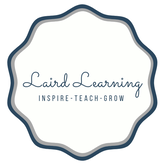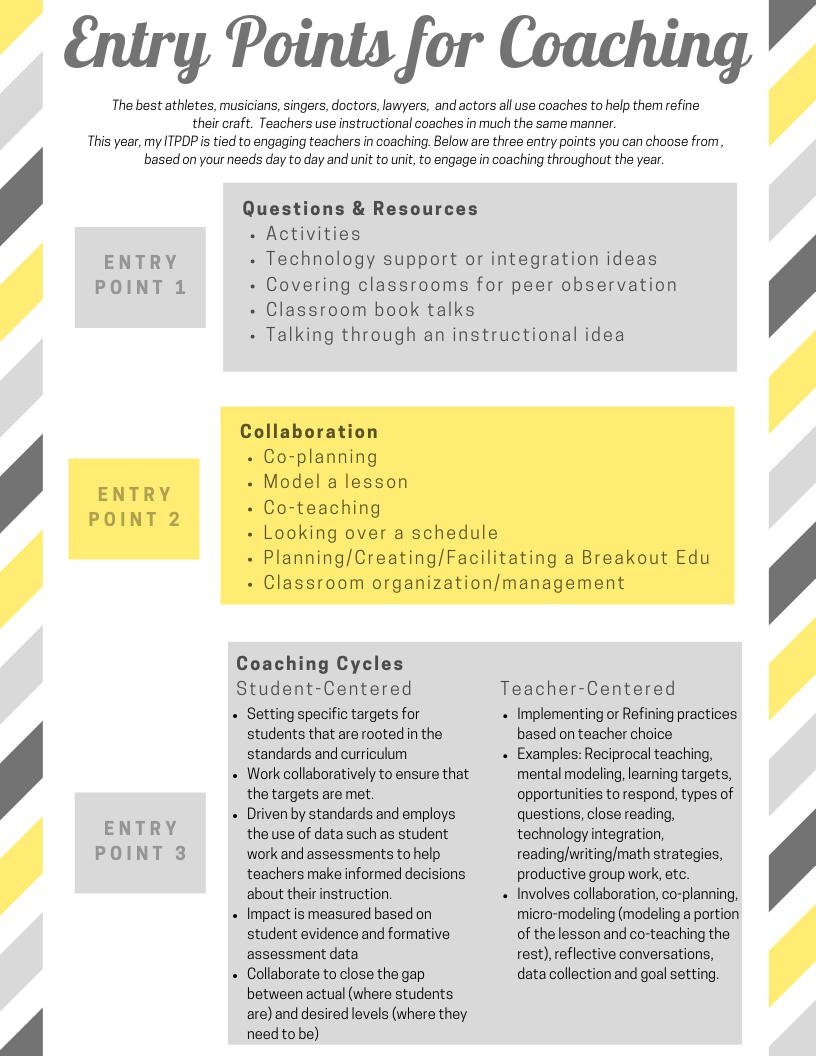|
For this year's ITPDP (Individual Teacher Professional Development Plan), I decided to track the types and frequency of teacher engagement in coaching. To do this, I put together an "Entry Points for Coaching" graphic and shared it with teachers. Each trimester, I will track the three types of entry points, identifying trends and reflecting on changes I can make to my coaching work. In addition to allowing me to track engagement in coaching, the graphic also communicates coaching to the teachers I support. Is there anything you would add to the graphic?
If you would like a copy of the graphic, let me know.
0 Comments
In my grad school classes, we are given the opportunity to reflect on articles and our own thinking. Below is an analytical essay from my Foundations of Inquiry course.
Article: Shulman, L. (1981). Disciplines of Inquiry in Education: An Overview. Educational Researcher, 10(6), 5-23. Prompt: In the conclusion to his essay, Shulman calls on educational researchers to not only engage in disciplined inquiry but to also participate as members of a community of scholars. He notes: "To engage in the process of inquiry, to become a scholar of and in education, is not only to take on the mantle of method and the rigor of discipline. It entails becoming an active member of a community of scholars and a community of educators. We must pursue and publish our research in ways that reflect the moral obligations of community membership. These obligations are entailed when we recognize that this is a community whose members are interdependent; each of us depends on the trust we can place in the work of other members of the community, because an intellectual and scholarly community rests on the assumptions that its member can build on each other's work" (p. 24) Starting from the premise that you think Shulman's argument is defensible, write a paper defending the ideal of disciplined inquiry and participating in the community of scholars against a possible objection. (For example: One might object that this ideal fails to account for the dissensus among scholars on norms of inquiry. What might a defender of Schulman say in response?). My Response: The “community of scholars” and the “community of educators,” to many these may represent or refer to two distinct groups, with little to no overlap in membership or purpose. Like generals vs. infantry, many scholars see themselves as research-focused, viewing education from a higher perspective without the desire to “get their feet wet”; while many teachers see themselves as learner-focused, viewing education from the front lines without the desire to “publish or perish.” I view them, as does Shulman, as “interdependent” members of a larger community (Shulman p. 26), who may have different processes or methods, but the same end goal: to teach. Certainly, the direct impact of student learning may be further removed from scholars, but the strategic information gained from this viewpoint allows for second-order changes to be implemented for learners across a system. And with teachers, the overall effect of the scholarly thought remains, albeit in a more subtle fashion, due to the cyclical nature (standards to be taught, practices to be employed, and the inquiry initiated to evaluate, and, if necessary, to adjust those instructional practices and standards) that is education, and pedagogy specifically. Recognizing the need for innovation in the way we teach, so that we can continue meeting the needs of students we serve, scholars and educators both engage in inquiry. This inquiry, as described by Dewey, involves both groups are testing for “scientific and social innovation” (Shulman p. 19). Without a doubt, just as there are different domains within education, there are also different methods of inquiry one can employ. For scholars, inquiry is disciplined, in that it is “framed by a question most important to the field” and utilizes defined “research settings, investigators, and methods” (Shulman p. 4). Inquiry is not a recipe or prescription for all scholars to follow; but, as with any scientific experiment, it needs to be repeatable. This requires communicating the precise actions taken, so that, if warranted, the experiment can be replicated. Also, given the communal aspect of scholarship, a single scholar’s word or findings should not be taken as law, but through reciprocal discourse, be examined to identify how the study’s learning can improve the field as a whole. Within the realm of classroom teachers, inquiry has a more problem-of-practice base, with educators identifying a learning objective, a student need, or an instructional practice that needs adjusting. Data, whether it be in the form of a pretest, common formative assessment, or peer comparison behavior data, will be collected, followed by an intervention (typically taken from scholarly research) being put in place, post-intervention data collected after a predetermined amount of time, and then analyzed to identify the impact of the intervention. Thus, on a smaller scale and with less-formal methods, the classroom teacher has modeled Lamert’s “teacher research” as they are the “subjects” and sometimes the “objects of research” and engaged in disciplined inquiry (Shulman p. 19). In my current role as an Instructional Coach, I serve as a bridge between teachers and scholars. It is in acting like that bridge, I am responsible for acting as a translator, of sorts, between the researchers and the teachers I serve. Based on the identified classroom needs, I seek out research studies, and based on the information the studies contain, model or co-teach in the classroom. In this way, I embody Shulman’s deeper analysis of the adage “publish or perish” as I rely on the “discoveries, integrations, and applications” that are published by scholars, and thereby learn from their teaching (Shulman p. 28). So, just as Shulman describes research as “beginning in wonder and curiosity, but ending in teaching” (Shulman p. 6), so too do teachers describe their learning. Given their focus on using inquiry both to innovate and to improve, scholars and teachers, together, leave their mark on the education system and students. With this in mind, these two communities aren’t so distinct after all. |
Archives
October 2023
Categories
All
|


 RSS Feed
RSS Feed
